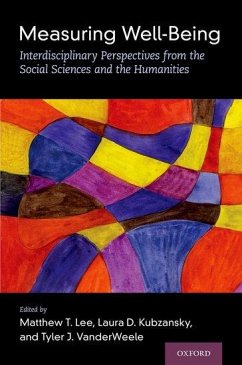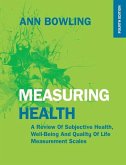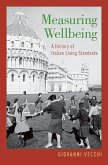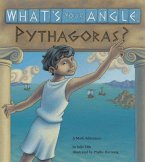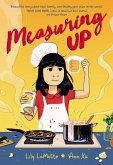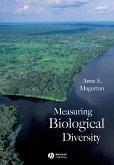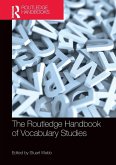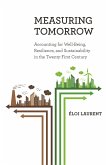Measuring Well-Being
Interdisciplinary Perspectives from the Social Sciences and the Humanities
Herausgeber: Lee, Matthew T; Vanderweele, Tyler J; Kubzansky, Laura D
Measuring Well-Being
Interdisciplinary Perspectives from the Social Sciences and the Humanities
Herausgeber: Lee, Matthew T; Vanderweele, Tyler J; Kubzansky, Laura D
- Gebundenes Buch
- Merkliste
- Auf die Merkliste
- Bewerten Bewerten
- Teilen
- Produkt teilen
- Produkterinnerung
- Produkterinnerung
This edited volume focuses on both conceptual and practical challenges in measuring well-being. Leveraging insights across diverse disciplines, contributors consider the philosophical and theological traditions on happiness, well-being and the good life, as well as recent empirical research on well-being and its measurement.
Andere Kunden interessierten sich auch für
![Measuring Health, 4th Edition Measuring Health, 4th Edition]() Ann BowlingMeasuring Health, 4th Edition46,99 €
Ann BowlingMeasuring Health, 4th Edition46,99 €![Measuring Wellbeing Measuring Wellbeing]() Giovanni Vecchi (Associate Profes Associate Professor of EconomicsMeasuring Wellbeing180,99 €
Giovanni Vecchi (Associate Profes Associate Professor of EconomicsMeasuring Wellbeing180,99 €![What's Your Angle, Pythagoras? What's Your Angle, Pythagoras?]() Julie EllisWhat's Your Angle, Pythagoras?14,99 €
Julie EllisWhat's Your Angle, Pythagoras?14,99 €![Measuring Up Measuring Up]() Lily LaMotteMeasuring Up17,99 €
Lily LaMotteMeasuring Up17,99 €![Measuring Biological Diversity Measuring Biological Diversity]() Anne E. Magurran (University of St Andrews)Measuring Biological Diversity117,99 €
Anne E. Magurran (University of St Andrews)Measuring Biological Diversity117,99 €![The Routledge Handbook of Vocabulary Studies The Routledge Handbook of Vocabulary Studies]() The Routledge Handbook of Vocabulary Studies52,99 €
The Routledge Handbook of Vocabulary Studies52,99 €![Measuring Tomorrow Measuring Tomorrow]() Eloi LaurentMeasuring Tomorrow34,99 €
Eloi LaurentMeasuring Tomorrow34,99 €-
-
-
This edited volume focuses on both conceptual and practical challenges in measuring well-being. Leveraging insights across diverse disciplines, contributors consider the philosophical and theological traditions on happiness, well-being and the good life, as well as recent empirical research on well-being and its measurement.
Hinweis: Dieser Artikel kann nur an eine deutsche Lieferadresse ausgeliefert werden.
Hinweis: Dieser Artikel kann nur an eine deutsche Lieferadresse ausgeliefert werden.
Produktdetails
- Produktdetails
- Verlag: Oxford University Press Inc
- Seitenzahl: 622
- Erscheinungstermin: 1. April 2021
- Englisch
- Abmessung: 236mm x 150mm x 43mm
- Gewicht: 972g
- ISBN-13: 9780197512531
- ISBN-10: 0197512534
- Artikelnr.: 60371257
- Herstellerkennzeichnung
- Libri GmbH
- Europaallee 1
- 36244 Bad Hersfeld
- gpsr@libri.de
- Verlag: Oxford University Press Inc
- Seitenzahl: 622
- Erscheinungstermin: 1. April 2021
- Englisch
- Abmessung: 236mm x 150mm x 43mm
- Gewicht: 972g
- ISBN-13: 9780197512531
- ISBN-10: 0197512534
- Artikelnr.: 60371257
- Herstellerkennzeichnung
- Libri GmbH
- Europaallee 1
- 36244 Bad Hersfeld
- gpsr@libri.de
Matthew T. Lee is Director of Empirical Research at the Human Flourishing Program in the Institute for Quantitative Social Science at Harvard University and coauthor of The Heart of Religion (Oxford University Press). His research explores pathways to human flourishing, benevolent service to others, and the integration of social science and the humanities. Laura D. Kubzansky is Lee Kum Kee Professor of Social and Behavioral Sciences and co-Director of the Lee Kum Sheung Center for Health and Happiness at the Harvard T.H. Chan School of Public Health. She has published extensively on the role of psychological and social factors in health. She has served on the leadership team for multiple training programs for junior scholars and is PI or co-investigator on numerous grants. Tyler J. VanderWeele is the John L. Loeb and Frances Lehman Loeb Professor of Epidemiology in the Departments of Epidemiology and Biostatistics at the Harvard T. H. Chan School of Public Health, Director of the Human Flourishing Program, and Co-Director of the Initiative on Health, Religion, and Spirituality at Harvard University. His research concerns methodology for distinguishing between association and causation in observational studies, and his empirical research spans psychiatric, perinatal, and social epidemiology; the science of happiness and flourishing; and the study of religion and health.
* Introduction
* Part 1: Empirical Research and Reflections on Well-Being Measurement
* Chapter 1: Measuring and Using Happiness to Support Public Policies,
John F. Helliwell
* Chapter 2: Reflections on the Introduction of Official Measures of
Subjective Well-Being in the UK: Moving from Measurement to Use, Paul
Allin
* Chapter 3: Assessments of Societal Subjective Well-Being: Ten
Methodological Issues for Consideration, Louis Tay, Andrew T. Jebb,
and Victoria S. Scotney
* Chapter 4: Eudaimonic and Hedonic Well-Being: An Integrative
Perspective with Linkages to Sociodemographic Factors and Health,
Carol D. Ryff, Jennifer Morozink Boylan, and Julie A. Kirsch
* Chapter 5: A Review of Psychological Well-Being and Mortality Risk:
Are All Dimensions of Psychological Well-Being Equal? Claudia
Trudel-Fitzgerald, Laura D. Kubzansky, and Tyler J. VanderWeele
* Part 2: Conceptual Reflections on Well-Being Measurement
* Chapter 6: "Positive Biology" and Well-Ordered Science, Colin
Farrelly
* Chapter 7: Philosophy of Well-Being for the Social Sciences: A
Primer, Guy Fletcher
* Chapter 8: Defending a Hybrid of Objective-List and Desire Theories
of Well-Being, William A. Lauinger
* Chapter 9: The Challenge of Measuring Well-Being as Philosophers
Conceive of It, Anne Baril
* Chapter 10: Human Flourishing: A Christian Theological Perspective,
Neil G. Messer
* Chapter 11: Comparing Empirical and Theological Perspectives on the
Relationship Between Hope and Aesthetic Experience: An Approach to
the Nature of Spiritual Well-Being, Mark Wynn
* Part 3: Advancing the Conversation about Measurement
* Chapter 12: The Comprehensive Measure of Meaning: Psychological and
Philosophical Foundations, Jeffrey Hanson and Tyler J. VanderWeele
* Chapter 13: Empirical Relationships among Five Types of Well-Being,
Seth Margolis, Eric Schwitzgebel, Daniel J. Ozer, and Sonja
Lyubomirsky
* Chapter 14: Measures of Community Well-Being: A Template, Tyler J.
VanderWeele
* Chapter 15: Inner Peace as a Contribution to Human Flourishing: A New
Scale Developed from Ancient Wisdom, Juan Xi and Matthew T. Lee
* Chapter 16: Tradition-Specific Measures of Spiritual Well-Being,
Tyler J. VanderWeele, Katelyn N. Long, and Michael J. Balboni
* Part 4: Scholarly Dialogue on the Science of Well-Being
* Chapter 17: Current Recommendations on the Selection of Measures for
Well-Being, Tyler J. VanderWeele, Claudia Trudel-Fitzgerald, Paul
Allin, Colin Farrelly, Guy Fletcher, Donald E. Frederick, Jon Hall,
John F. Helliwell, Eric S. Kim, William A. Lauinger, Matthew T. Lee,
Sonja Lyubomirsky, Seth Margolis, Eileen McNeely, Neil G. Messer,
Louis Tay, Vish Viswanath, Dorota Woziak-Biaowolska, Laura D.
Kubzansky
* Chapter 18: Advancing the Science of Well-Being: A Dissenting View on
Measurement Recommendations, Carol D. Ryff, Jennifer Morozink Boylan,
and Julie A. Kirsch
* Chapter 19: Response to "Advancing the Science of Well-Being: A
Dissenting View on Measurement Recommendations," Tyler J.
VanderWeele, Claudia Trudel-Fitzgerald, and Laura D. Kubzansky
* Chapter 20: Response to Response: Growing the Field of Well-Being,
Carol D. Ryff, Jennifer Morozink Boylan, and Julie A. Kirsch
* Conclusion, Matthew T. Lee, Laura D. Kubzansky, and Tyler J.
VanderWeele
* Part 1: Empirical Research and Reflections on Well-Being Measurement
* Chapter 1: Measuring and Using Happiness to Support Public Policies,
John F. Helliwell
* Chapter 2: Reflections on the Introduction of Official Measures of
Subjective Well-Being in the UK: Moving from Measurement to Use, Paul
Allin
* Chapter 3: Assessments of Societal Subjective Well-Being: Ten
Methodological Issues for Consideration, Louis Tay, Andrew T. Jebb,
and Victoria S. Scotney
* Chapter 4: Eudaimonic and Hedonic Well-Being: An Integrative
Perspective with Linkages to Sociodemographic Factors and Health,
Carol D. Ryff, Jennifer Morozink Boylan, and Julie A. Kirsch
* Chapter 5: A Review of Psychological Well-Being and Mortality Risk:
Are All Dimensions of Psychological Well-Being Equal? Claudia
Trudel-Fitzgerald, Laura D. Kubzansky, and Tyler J. VanderWeele
* Part 2: Conceptual Reflections on Well-Being Measurement
* Chapter 6: "Positive Biology" and Well-Ordered Science, Colin
Farrelly
* Chapter 7: Philosophy of Well-Being for the Social Sciences: A
Primer, Guy Fletcher
* Chapter 8: Defending a Hybrid of Objective-List and Desire Theories
of Well-Being, William A. Lauinger
* Chapter 9: The Challenge of Measuring Well-Being as Philosophers
Conceive of It, Anne Baril
* Chapter 10: Human Flourishing: A Christian Theological Perspective,
Neil G. Messer
* Chapter 11: Comparing Empirical and Theological Perspectives on the
Relationship Between Hope and Aesthetic Experience: An Approach to
the Nature of Spiritual Well-Being, Mark Wynn
* Part 3: Advancing the Conversation about Measurement
* Chapter 12: The Comprehensive Measure of Meaning: Psychological and
Philosophical Foundations, Jeffrey Hanson and Tyler J. VanderWeele
* Chapter 13: Empirical Relationships among Five Types of Well-Being,
Seth Margolis, Eric Schwitzgebel, Daniel J. Ozer, and Sonja
Lyubomirsky
* Chapter 14: Measures of Community Well-Being: A Template, Tyler J.
VanderWeele
* Chapter 15: Inner Peace as a Contribution to Human Flourishing: A New
Scale Developed from Ancient Wisdom, Juan Xi and Matthew T. Lee
* Chapter 16: Tradition-Specific Measures of Spiritual Well-Being,
Tyler J. VanderWeele, Katelyn N. Long, and Michael J. Balboni
* Part 4: Scholarly Dialogue on the Science of Well-Being
* Chapter 17: Current Recommendations on the Selection of Measures for
Well-Being, Tyler J. VanderWeele, Claudia Trudel-Fitzgerald, Paul
Allin, Colin Farrelly, Guy Fletcher, Donald E. Frederick, Jon Hall,
John F. Helliwell, Eric S. Kim, William A. Lauinger, Matthew T. Lee,
Sonja Lyubomirsky, Seth Margolis, Eileen McNeely, Neil G. Messer,
Louis Tay, Vish Viswanath, Dorota Woziak-Biaowolska, Laura D.
Kubzansky
* Chapter 18: Advancing the Science of Well-Being: A Dissenting View on
Measurement Recommendations, Carol D. Ryff, Jennifer Morozink Boylan,
and Julie A. Kirsch
* Chapter 19: Response to "Advancing the Science of Well-Being: A
Dissenting View on Measurement Recommendations," Tyler J.
VanderWeele, Claudia Trudel-Fitzgerald, and Laura D. Kubzansky
* Chapter 20: Response to Response: Growing the Field of Well-Being,
Carol D. Ryff, Jennifer Morozink Boylan, and Julie A. Kirsch
* Conclusion, Matthew T. Lee, Laura D. Kubzansky, and Tyler J.
VanderWeele
* Introduction
* Part 1: Empirical Research and Reflections on Well-Being Measurement
* Chapter 1: Measuring and Using Happiness to Support Public Policies,
John F. Helliwell
* Chapter 2: Reflections on the Introduction of Official Measures of
Subjective Well-Being in the UK: Moving from Measurement to Use, Paul
Allin
* Chapter 3: Assessments of Societal Subjective Well-Being: Ten
Methodological Issues for Consideration, Louis Tay, Andrew T. Jebb,
and Victoria S. Scotney
* Chapter 4: Eudaimonic and Hedonic Well-Being: An Integrative
Perspective with Linkages to Sociodemographic Factors and Health,
Carol D. Ryff, Jennifer Morozink Boylan, and Julie A. Kirsch
* Chapter 5: A Review of Psychological Well-Being and Mortality Risk:
Are All Dimensions of Psychological Well-Being Equal? Claudia
Trudel-Fitzgerald, Laura D. Kubzansky, and Tyler J. VanderWeele
* Part 2: Conceptual Reflections on Well-Being Measurement
* Chapter 6: "Positive Biology" and Well-Ordered Science, Colin
Farrelly
* Chapter 7: Philosophy of Well-Being for the Social Sciences: A
Primer, Guy Fletcher
* Chapter 8: Defending a Hybrid of Objective-List and Desire Theories
of Well-Being, William A. Lauinger
* Chapter 9: The Challenge of Measuring Well-Being as Philosophers
Conceive of It, Anne Baril
* Chapter 10: Human Flourishing: A Christian Theological Perspective,
Neil G. Messer
* Chapter 11: Comparing Empirical and Theological Perspectives on the
Relationship Between Hope and Aesthetic Experience: An Approach to
the Nature of Spiritual Well-Being, Mark Wynn
* Part 3: Advancing the Conversation about Measurement
* Chapter 12: The Comprehensive Measure of Meaning: Psychological and
Philosophical Foundations, Jeffrey Hanson and Tyler J. VanderWeele
* Chapter 13: Empirical Relationships among Five Types of Well-Being,
Seth Margolis, Eric Schwitzgebel, Daniel J. Ozer, and Sonja
Lyubomirsky
* Chapter 14: Measures of Community Well-Being: A Template, Tyler J.
VanderWeele
* Chapter 15: Inner Peace as a Contribution to Human Flourishing: A New
Scale Developed from Ancient Wisdom, Juan Xi and Matthew T. Lee
* Chapter 16: Tradition-Specific Measures of Spiritual Well-Being,
Tyler J. VanderWeele, Katelyn N. Long, and Michael J. Balboni
* Part 4: Scholarly Dialogue on the Science of Well-Being
* Chapter 17: Current Recommendations on the Selection of Measures for
Well-Being, Tyler J. VanderWeele, Claudia Trudel-Fitzgerald, Paul
Allin, Colin Farrelly, Guy Fletcher, Donald E. Frederick, Jon Hall,
John F. Helliwell, Eric S. Kim, William A. Lauinger, Matthew T. Lee,
Sonja Lyubomirsky, Seth Margolis, Eileen McNeely, Neil G. Messer,
Louis Tay, Vish Viswanath, Dorota Woziak-Biaowolska, Laura D.
Kubzansky
* Chapter 18: Advancing the Science of Well-Being: A Dissenting View on
Measurement Recommendations, Carol D. Ryff, Jennifer Morozink Boylan,
and Julie A. Kirsch
* Chapter 19: Response to "Advancing the Science of Well-Being: A
Dissenting View on Measurement Recommendations," Tyler J.
VanderWeele, Claudia Trudel-Fitzgerald, and Laura D. Kubzansky
* Chapter 20: Response to Response: Growing the Field of Well-Being,
Carol D. Ryff, Jennifer Morozink Boylan, and Julie A. Kirsch
* Conclusion, Matthew T. Lee, Laura D. Kubzansky, and Tyler J.
VanderWeele
* Part 1: Empirical Research and Reflections on Well-Being Measurement
* Chapter 1: Measuring and Using Happiness to Support Public Policies,
John F. Helliwell
* Chapter 2: Reflections on the Introduction of Official Measures of
Subjective Well-Being in the UK: Moving from Measurement to Use, Paul
Allin
* Chapter 3: Assessments of Societal Subjective Well-Being: Ten
Methodological Issues for Consideration, Louis Tay, Andrew T. Jebb,
and Victoria S. Scotney
* Chapter 4: Eudaimonic and Hedonic Well-Being: An Integrative
Perspective with Linkages to Sociodemographic Factors and Health,
Carol D. Ryff, Jennifer Morozink Boylan, and Julie A. Kirsch
* Chapter 5: A Review of Psychological Well-Being and Mortality Risk:
Are All Dimensions of Psychological Well-Being Equal? Claudia
Trudel-Fitzgerald, Laura D. Kubzansky, and Tyler J. VanderWeele
* Part 2: Conceptual Reflections on Well-Being Measurement
* Chapter 6: "Positive Biology" and Well-Ordered Science, Colin
Farrelly
* Chapter 7: Philosophy of Well-Being for the Social Sciences: A
Primer, Guy Fletcher
* Chapter 8: Defending a Hybrid of Objective-List and Desire Theories
of Well-Being, William A. Lauinger
* Chapter 9: The Challenge of Measuring Well-Being as Philosophers
Conceive of It, Anne Baril
* Chapter 10: Human Flourishing: A Christian Theological Perspective,
Neil G. Messer
* Chapter 11: Comparing Empirical and Theological Perspectives on the
Relationship Between Hope and Aesthetic Experience: An Approach to
the Nature of Spiritual Well-Being, Mark Wynn
* Part 3: Advancing the Conversation about Measurement
* Chapter 12: The Comprehensive Measure of Meaning: Psychological and
Philosophical Foundations, Jeffrey Hanson and Tyler J. VanderWeele
* Chapter 13: Empirical Relationships among Five Types of Well-Being,
Seth Margolis, Eric Schwitzgebel, Daniel J. Ozer, and Sonja
Lyubomirsky
* Chapter 14: Measures of Community Well-Being: A Template, Tyler J.
VanderWeele
* Chapter 15: Inner Peace as a Contribution to Human Flourishing: A New
Scale Developed from Ancient Wisdom, Juan Xi and Matthew T. Lee
* Chapter 16: Tradition-Specific Measures of Spiritual Well-Being,
Tyler J. VanderWeele, Katelyn N. Long, and Michael J. Balboni
* Part 4: Scholarly Dialogue on the Science of Well-Being
* Chapter 17: Current Recommendations on the Selection of Measures for
Well-Being, Tyler J. VanderWeele, Claudia Trudel-Fitzgerald, Paul
Allin, Colin Farrelly, Guy Fletcher, Donald E. Frederick, Jon Hall,
John F. Helliwell, Eric S. Kim, William A. Lauinger, Matthew T. Lee,
Sonja Lyubomirsky, Seth Margolis, Eileen McNeely, Neil G. Messer,
Louis Tay, Vish Viswanath, Dorota Woziak-Biaowolska, Laura D.
Kubzansky
* Chapter 18: Advancing the Science of Well-Being: A Dissenting View on
Measurement Recommendations, Carol D. Ryff, Jennifer Morozink Boylan,
and Julie A. Kirsch
* Chapter 19: Response to "Advancing the Science of Well-Being: A
Dissenting View on Measurement Recommendations," Tyler J.
VanderWeele, Claudia Trudel-Fitzgerald, and Laura D. Kubzansky
* Chapter 20: Response to Response: Growing the Field of Well-Being,
Carol D. Ryff, Jennifer Morozink Boylan, and Julie A. Kirsch
* Conclusion, Matthew T. Lee, Laura D. Kubzansky, and Tyler J.
VanderWeele

